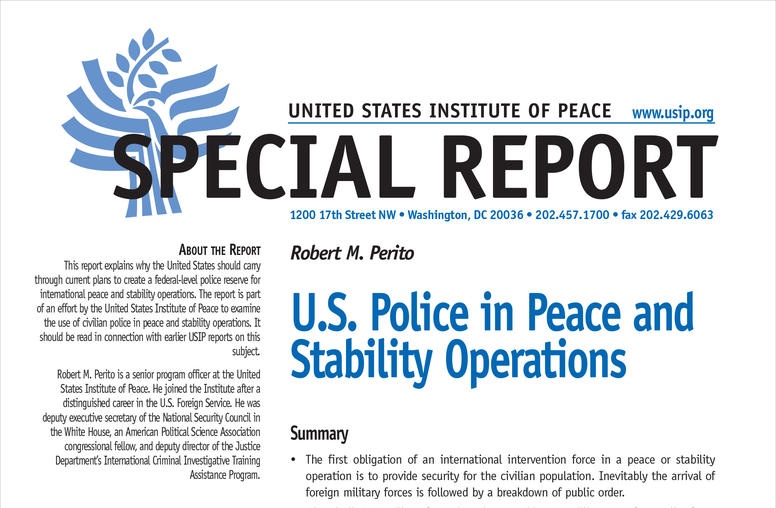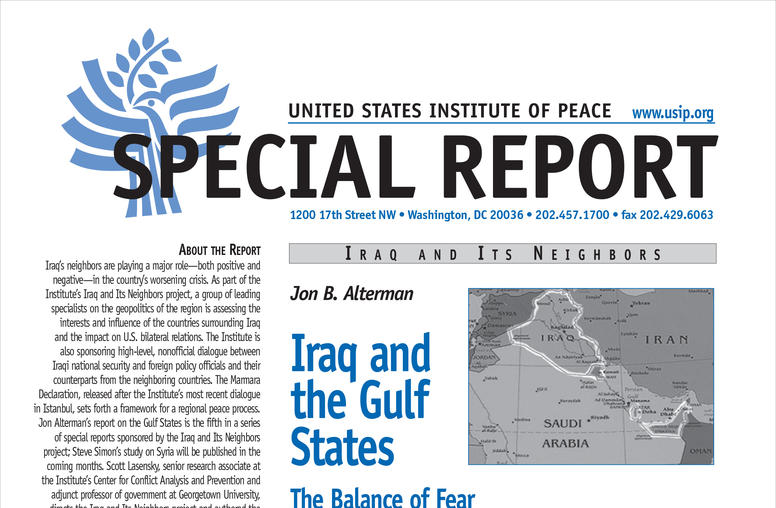Publications
Articles, publications, books, tools and multimedia features from the U.S. Institute of Peace provide the latest news, analysis, research findings, practitioner guides and reports, all related to the conflict zones and issues that are at the center of the Institute’s work to prevent and reduce violent conflict.
New Hopes for Negotiated Solutions in Colombia
Drawing from a series of conferences and events organized by USIP, this report examines the status of current peace initiatives in Colombia with the National Liberation Army (ELN) and the Colombian Revolutionary Armed Forces (FARC). It also assesses the paramilitary demobilization process and analyzes the role of local, national, and international third-party actors in each of these processes. The analysis reflects developments on the ground through the end of September 2007.
Double Alienation and Muslim Youth in Europe
From the controversy raging in London over Muslim women wearing the niqab to the upsurge in violent crime in Paris, Muslims in Europe are at the center of a storm of disagreement. Although many Muslim youth are comfortable as Muslim and European, others feel estranged from society.
Hearts and Minds: Afghan Opinion on the Taliban, the Government and the International Forces
Since the election of new leaders and the establishment of a new constitution, the government of Afghanistan has been trying to prove its legitimacy and ability to foster stability, security, and the rule of law. Understanding current trends in public opinion can aid in tailoring the international intervention to ensure that prior progress is not lost and that elements corroding the strength of the state are diminished.
Violence in the Terai Region and the Madhesi Movement: Prospects for Peace in Nepal
Despite marked progress toward peace and democracy in Nepal, the Terai region, located in the southern lowlands of Nepal near the border of India, has experienced a surge in violence in last six months. What are the prospects for peace in Nepal?

U.S. Police in Peace and Stability Operations
The first obligation of an international intervention force in a peace or stability operation is to provide security for the civilian population. Inevitably the arrival of foreign military forces is followed by a breakdown of public order. The United States should carry through plans to create a federal-level police reserve for international police and stability operations.

Iraq and the Gulf States: The Balance of Fear
Iraq’s Persian Gulf neighbors supported the U.S. invasion of Iraq in order to preserve the status quo--a weak and self-absorbed Iraq--rather than to impose a new one. However, the overthrow of Saddam Hussein and its aftermath have not brought stability to the Gulf States as much as they have shifted the most serious challenges from external threats (of a hostile Baghdad) to internal threats (the threat of conflict spillover from Iraq).

Unity in Diversity
Nowhere are the stakes of sectarian conflict as high as in the Middle East, and nowhere is the practice of interfaith dialogue (IFD) more fraught with difficulty. The questions, then, naturally arise: What sort of person tries something as audacious as interfaith dialogue in such a polarized climate? And what do they hope to gain? The answers to both questions are surprisingly diverse.
Constituent Assembly Elections and Security in Nepal
What are the security challenges Nepal faces in the run up to the November 2007 constituent assembly elections? Lack of resources, the need for training and retraining, violence in the Terai (plains), and increased crime and lawlessness are only a few of the challenges identified through a series of meetings and group dialogue sessions held by USIP.
Special Court of Sierra Leone Briefing: The Taylor Trial and Lessons from Capacity-Building and Outreach
Against a backdrop of halting progress by many international courts, the Special Court of Sierra Leone (SCSL) has quietly had significant success in accomplishing its mission to provide justice for the perpetrators most responsible for the horrific crimes committed against the people of Sierra Leone.
Child Soldiers: New Evidence, New Advocacy Approaches
In over 30 conflict zones today there are estimated to be upwards of 300,000 children used to support military activities as porters, sentries, sex slaves, spies, and combatants. What are the factors that might hinder attempts to curb the use of child soldiers, to prevent their recruitment, and to successfully reintegrate ex-combatants into their communities?